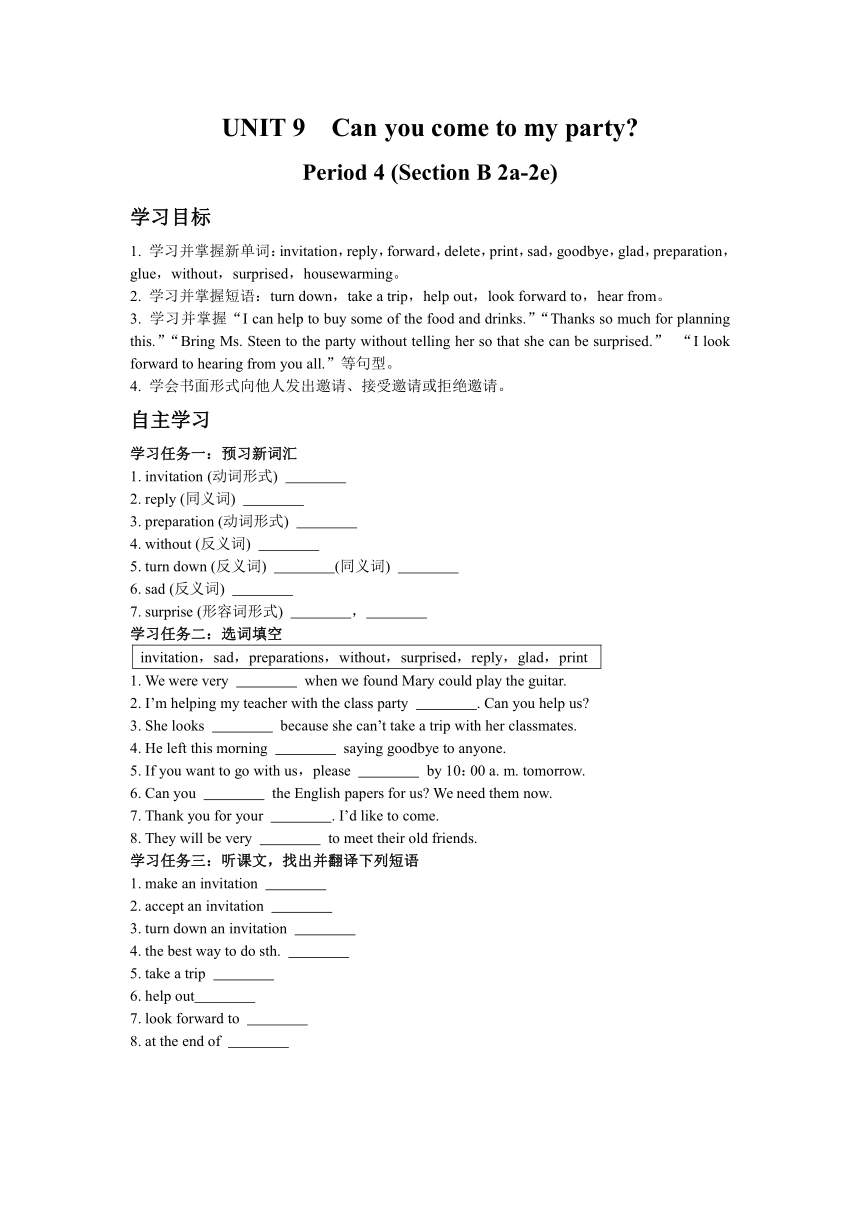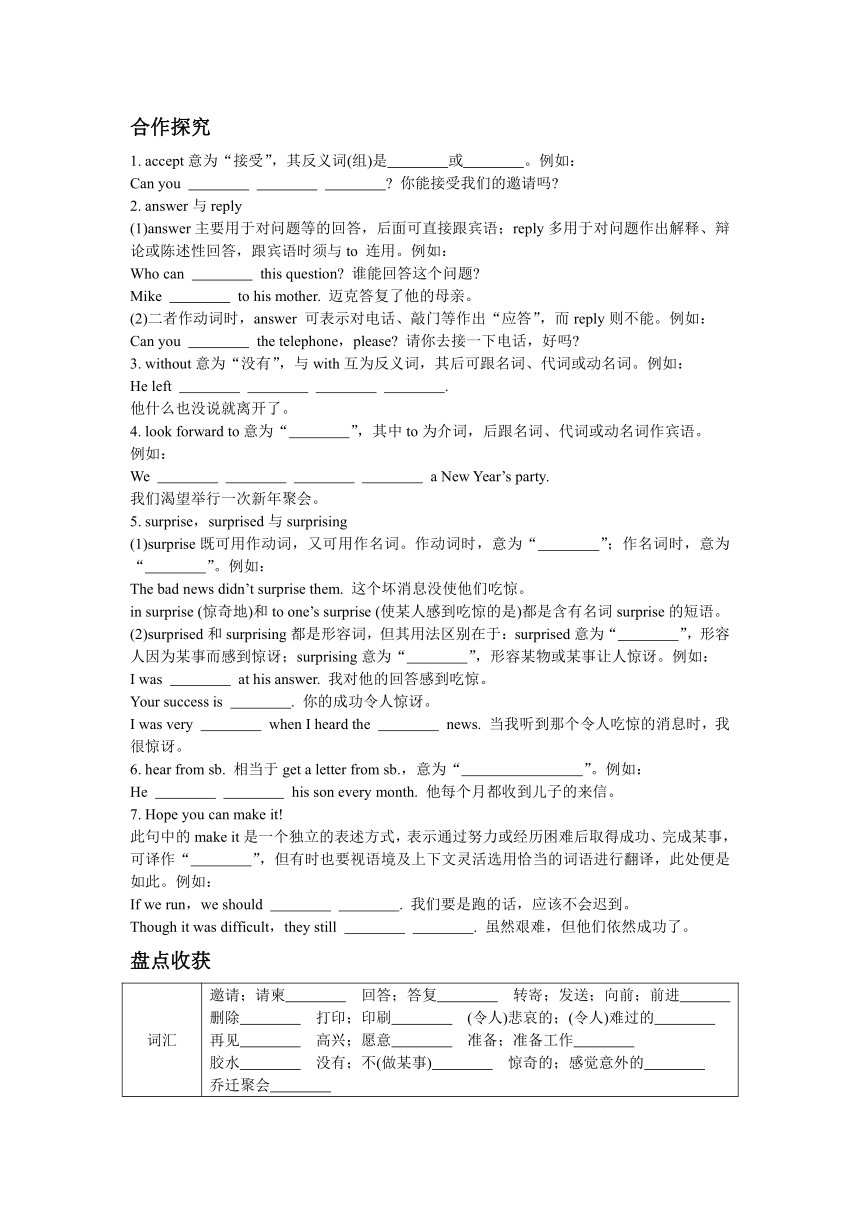Unit 9 Can you come to my party? Period 4(Section B 2a-2e)学案(含答案)
文档属性
| 名称 | Unit 9 Can you come to my party? Period 4(Section B 2a-2e)学案(含答案) |

|
|
| 格式 | docx | ||
| 文件大小 | 19.4KB | ||
| 资源类型 | 教案 | ||
| 版本资源 | 人教新目标(Go for it)版 | ||
| 科目 | 英语 | ||
| 更新时间 | 2023-07-26 08:27:01 | ||
图片预览


文档简介
UNIT 9 Can you come to my party
Period 4 (Section B 2a-2e)
学习目标
1. 学习并掌握新单词:invitation,reply,forward,delete,print,sad,goodbye,glad,preparation,glue,without,surprised,housewarming。
2. 学习并掌握短语:turn down,take a trip,help out,look forward to,hear from。
3. 学习并掌握“I can help to buy some of the food and drinks.”“Thanks so much for planning this.”“Bring Ms. Steen to the party without telling her so that she can be surprised.” “I look forward to hearing from you all.”等句型。
4. 学会书面形式向他人发出邀请、接受邀请或拒绝邀请。
自主学习
学习任务一:预习新词汇
1. invitation (动词形式)
2. reply (同义词)
3. preparation (动词形式)
4. without (反义词)
5. turn down (反义词) (同义词)
6. sad (反义词)
7. surprise (形容词形式) ,
学习任务二:选词填空
invitation,sad,preparations,without,surprised,reply,glad,print
1. We were very when we found Mary could play the guitar.
2. I’m helping my teacher with the class party . Can you help us
3. She looks because she can’t take a trip with her classmates.
4. He left this morning saying goodbye to anyone.
5. If you want to go with us,please by 10:00 a. m. tomorrow.
6. Can you the English papers for us We need them now.
7. Thank you for your . I’d like to come.
8. They will be very to meet their old friends.
学习任务三:听课文,找出并翻译下列短语
1. make an invitation
2. accept an invitation
3. turn down an invitation
4. the best way to do sth.
5. take a trip
6. help out
7. look forward to
8. at the end of
合作探究
1. accept意为“接受”,其反义词(组)是 或 。例如:
Can you 你能接受我们的邀请吗
2. answer与reply
(1)answer主要用于对问题等的回答,后面可直接跟宾语;reply多用于对问题作出解释、辩论或陈述性回答,跟宾语时须与to 连用。例如:
Who can this question 谁能回答这个问题
Mike to his mother. 迈克答复了他的母亲。
(2)二者作动词时,answer 可表示对电话、敲门等作出“应答”,而reply则不能。例如:
Can you the telephone,please 请你去接一下电话,好吗
3. without意为“没有”,与with互为反义词,其后可跟名词、代词或动名词。例如:
He left .
他什么也没说就离开了。
4. look forward to意为“ ”,其中to为介词,后跟名词、代词或动名词作宾语。
例如:
We a New Year’s party.
我们渴望举行一次新年聚会。
5. surprise,surprised与surprising
(1)surprise既可用作动词,又可用作名词。作动词时,意为“ ”;作名词时,意为“ ”。例如:
The bad news didn’t surprise them. 这个坏消息没使他们吃惊。
in surprise (惊奇地)和to one’s surprise (使某人感到吃惊的是)都是含有名词surprise的短语。
(2)surprised和surprising都是形容词,但其用法区别在于:surprised意为“ ”,形容人因为某事而感到惊讶;surprising意为“ ”,形容某物或某事让人惊讶。例如:
I was at his answer. 我对他的回答感到吃惊。
Your success is . 你的成功令人惊讶。
I was very when I heard the news. 当我听到那个令人吃惊的消息时,我很惊讶。
6. hear from sb. 相当于get a letter from sb.,意为“ ”。例如:
He his son every month. 他每个月都收到儿子的来信。
7. Hope you can make it!
此句中的make it是一个独立的表述方式,表示通过努力或经历困难后取得成功、完成某事,可译作“ ”,但有时也要视语境及上下文灵活选用恰当的词语进行翻译,此处便是如此。例如:
If we run,we should . 我们要是跑的话,应该不会迟到。
Though it was difficult,they still . 虽然艰难,但他们依然成功了。
盘点收获
词汇 邀请;请柬 回答;答复 转寄;发送;向前;前进 删除 打印;印刷 (令人)悲哀的;(令人)难过的 再见 高兴;愿意 准备;准备工作 胶水 没有;不(做某事) 惊奇的;感觉意外的 乔迁聚会
续表
短语 拒绝 去旅行 (帮助……)分担工作、解决难题 盼望;期待 接到(某人的)信、电话等
句型 我可以帮忙买一些食物和饮料。 非常感谢你计划这个(聚会)。 在没有告知她的情况下,把斯蒂恩女士带来参加聚会,这样她会感到意外。 我期待收到你们所有人的来信。
语言交际 能读懂邀请函,能自主表达接受或拒绝邀请,并能掌握必要的信息
当堂达标
Ⅰ. 根据句意及首字母提示完成单词
1. This article is too long. Please d some sentences.
2. My grandparents were very g to see me when I visited them last Saturday.
3. I asked him the reason,but he didn’t r .
4. I’m leaving,so I come here to say g to you.
5. What s news! Tim got hurt in an accident.
Ⅱ. 用所给单词的适当形式填空
1. Thank you for your (invite).
2. I look forward to (visit) Hong Kong-Zhuhai-Macao Bridge one day.
3. Every one was very (surprise) at his coming.
4. They are making (prepare) for the singing competition.
5. The best way (improve) your English is to practice it every day.
Ⅲ. 根据汉语意思完成句子
1. 我的女儿盼望着去动物园。
My daughter to the zoo.
2. 上个月汤姆没有收到笔友的来信。
Tom his pen pal last month.
3. 我对这则消息感到吃惊。
I was the news.
4. 我的父母经常让我帮助我的弟弟解决困难。
My parents often ask me to my brother.
5. 他们没有回复我的邀请。
They my invitation.
学后反思
___________________________________________________________________________________________________________________________________________________________________________________________________________________________________________________________________________________________________________________________________________________________________________________________________________
当堂达标参考答案与解析:
Ⅰ. 1. delete 根据前句句意“文章太长了”可知,空格所在句句意为“请删除一些句子”。delete意为“删除”,“please+动词原形”是祈使句句型,故填delete。
2. glad 句意:上周六我去探望我的外祖父母时,他们看到我很高兴。glad形容词,意为“高兴的”,符合句意,故填glad。
3. reply 根据关键词but可知,他没有回复。reply动词,意为“回复”,助动词didn’t+动词原形,故填reply。
4. goodbye 根据leaving可知句意为“我将要走了,我来这里跟你道别”,say goodbye to sb. 意为“与某人道别”,故填goodbye。
5. sad 根据后句“汤姆在事故中受伤了”可知,这是一个悲伤的消息,sad意为“悲伤的”,符合句意,故填sad。
Ⅱ. 1. invitation your为形容词性物主代词,后接invite的名词形式invitation。
2. visiting look forward to doing sth. 意为“期盼做某事”,故填visiting。
3. surprised be surprised at sth. 意为“对某物充满惊讶”,故填surprised。
4. preparations make preparations for意为“为……做准备”,故填preparations。
5. to improve the best way to do sth. 意为“做某事的最好方式”,故填to improve。
Ⅲ. 1. looks forward to going 2. didn’t hear from 3. surprised at 4. help out with
5. didn’t reply to
Period 4 (Section B 2a-2e)
学习目标
1. 学习并掌握新单词:invitation,reply,forward,delete,print,sad,goodbye,glad,preparation,glue,without,surprised,housewarming。
2. 学习并掌握短语:turn down,take a trip,help out,look forward to,hear from。
3. 学习并掌握“I can help to buy some of the food and drinks.”“Thanks so much for planning this.”“Bring Ms. Steen to the party without telling her so that she can be surprised.” “I look forward to hearing from you all.”等句型。
4. 学会书面形式向他人发出邀请、接受邀请或拒绝邀请。
自主学习
学习任务一:预习新词汇
1. invitation (动词形式)
2. reply (同义词)
3. preparation (动词形式)
4. without (反义词)
5. turn down (反义词) (同义词)
6. sad (反义词)
7. surprise (形容词形式) ,
学习任务二:选词填空
invitation,sad,preparations,without,surprised,reply,glad,print
1. We were very when we found Mary could play the guitar.
2. I’m helping my teacher with the class party . Can you help us
3. She looks because she can’t take a trip with her classmates.
4. He left this morning saying goodbye to anyone.
5. If you want to go with us,please by 10:00 a. m. tomorrow.
6. Can you the English papers for us We need them now.
7. Thank you for your . I’d like to come.
8. They will be very to meet their old friends.
学习任务三:听课文,找出并翻译下列短语
1. make an invitation
2. accept an invitation
3. turn down an invitation
4. the best way to do sth.
5. take a trip
6. help out
7. look forward to
8. at the end of
合作探究
1. accept意为“接受”,其反义词(组)是 或 。例如:
Can you 你能接受我们的邀请吗
2. answer与reply
(1)answer主要用于对问题等的回答,后面可直接跟宾语;reply多用于对问题作出解释、辩论或陈述性回答,跟宾语时须与to 连用。例如:
Who can this question 谁能回答这个问题
Mike to his mother. 迈克答复了他的母亲。
(2)二者作动词时,answer 可表示对电话、敲门等作出“应答”,而reply则不能。例如:
Can you the telephone,please 请你去接一下电话,好吗
3. without意为“没有”,与with互为反义词,其后可跟名词、代词或动名词。例如:
He left .
他什么也没说就离开了。
4. look forward to意为“ ”,其中to为介词,后跟名词、代词或动名词作宾语。
例如:
We a New Year’s party.
我们渴望举行一次新年聚会。
5. surprise,surprised与surprising
(1)surprise既可用作动词,又可用作名词。作动词时,意为“ ”;作名词时,意为“ ”。例如:
The bad news didn’t surprise them. 这个坏消息没使他们吃惊。
in surprise (惊奇地)和to one’s surprise (使某人感到吃惊的是)都是含有名词surprise的短语。
(2)surprised和surprising都是形容词,但其用法区别在于:surprised意为“ ”,形容人因为某事而感到惊讶;surprising意为“ ”,形容某物或某事让人惊讶。例如:
I was at his answer. 我对他的回答感到吃惊。
Your success is . 你的成功令人惊讶。
I was very when I heard the news. 当我听到那个令人吃惊的消息时,我很惊讶。
6. hear from sb. 相当于get a letter from sb.,意为“ ”。例如:
He his son every month. 他每个月都收到儿子的来信。
7. Hope you can make it!
此句中的make it是一个独立的表述方式,表示通过努力或经历困难后取得成功、完成某事,可译作“ ”,但有时也要视语境及上下文灵活选用恰当的词语进行翻译,此处便是如此。例如:
If we run,we should . 我们要是跑的话,应该不会迟到。
Though it was difficult,they still . 虽然艰难,但他们依然成功了。
盘点收获
词汇 邀请;请柬 回答;答复 转寄;发送;向前;前进 删除 打印;印刷 (令人)悲哀的;(令人)难过的 再见 高兴;愿意 准备;准备工作 胶水 没有;不(做某事) 惊奇的;感觉意外的 乔迁聚会
续表
短语 拒绝 去旅行 (帮助……)分担工作、解决难题 盼望;期待 接到(某人的)信、电话等
句型 我可以帮忙买一些食物和饮料。 非常感谢你计划这个(聚会)。 在没有告知她的情况下,把斯蒂恩女士带来参加聚会,这样她会感到意外。 我期待收到你们所有人的来信。
语言交际 能读懂邀请函,能自主表达接受或拒绝邀请,并能掌握必要的信息
当堂达标
Ⅰ. 根据句意及首字母提示完成单词
1. This article is too long. Please d some sentences.
2. My grandparents were very g to see me when I visited them last Saturday.
3. I asked him the reason,but he didn’t r .
4. I’m leaving,so I come here to say g to you.
5. What s news! Tim got hurt in an accident.
Ⅱ. 用所给单词的适当形式填空
1. Thank you for your (invite).
2. I look forward to (visit) Hong Kong-Zhuhai-Macao Bridge one day.
3. Every one was very (surprise) at his coming.
4. They are making (prepare) for the singing competition.
5. The best way (improve) your English is to practice it every day.
Ⅲ. 根据汉语意思完成句子
1. 我的女儿盼望着去动物园。
My daughter to the zoo.
2. 上个月汤姆没有收到笔友的来信。
Tom his pen pal last month.
3. 我对这则消息感到吃惊。
I was the news.
4. 我的父母经常让我帮助我的弟弟解决困难。
My parents often ask me to my brother.
5. 他们没有回复我的邀请。
They my invitation.
学后反思
___________________________________________________________________________________________________________________________________________________________________________________________________________________________________________________________________________________________________________________________________________________________________________________________________________
当堂达标参考答案与解析:
Ⅰ. 1. delete 根据前句句意“文章太长了”可知,空格所在句句意为“请删除一些句子”。delete意为“删除”,“please+动词原形”是祈使句句型,故填delete。
2. glad 句意:上周六我去探望我的外祖父母时,他们看到我很高兴。glad形容词,意为“高兴的”,符合句意,故填glad。
3. reply 根据关键词but可知,他没有回复。reply动词,意为“回复”,助动词didn’t+动词原形,故填reply。
4. goodbye 根据leaving可知句意为“我将要走了,我来这里跟你道别”,say goodbye to sb. 意为“与某人道别”,故填goodbye。
5. sad 根据后句“汤姆在事故中受伤了”可知,这是一个悲伤的消息,sad意为“悲伤的”,符合句意,故填sad。
Ⅱ. 1. invitation your为形容词性物主代词,后接invite的名词形式invitation。
2. visiting look forward to doing sth. 意为“期盼做某事”,故填visiting。
3. surprised be surprised at sth. 意为“对某物充满惊讶”,故填surprised。
4. preparations make preparations for意为“为……做准备”,故填preparations。
5. to improve the best way to do sth. 意为“做某事的最好方式”,故填to improve。
Ⅲ. 1. looks forward to going 2. didn’t hear from 3. surprised at 4. help out with
5. didn’t reply to
同课章节目录
- Unit 1 Where did you go on vacation?
- Section A
- Section B
- Unit 2 How often do you exercise?
- Section A
- Section B
- Unit 3 I'm more outgoing than my sister.
- Section A
- Section B
- Unit 4 What's the best movie theater?
- Section A
- Section B
- Unit 5 Do you want to watch a game show?
- Section A
- Section B
- Unit 6 I'm going to study computer science.
- Section A
- Section B
- Unit 7 Will people have robots?
- Section A
- Section B
- Unit 8 How do you make a banana milk shake?
- Section A
- Section B
- Unit 9 Can you come to my party?
- Section A
- Section B
- Unit 10 If you go to the party, you'll have a grea
- Section A
- Section B
